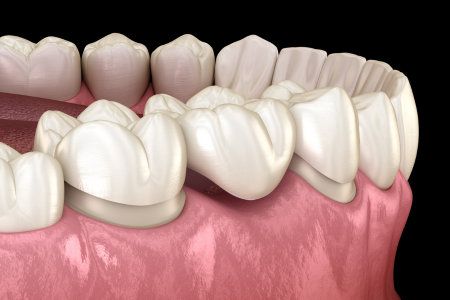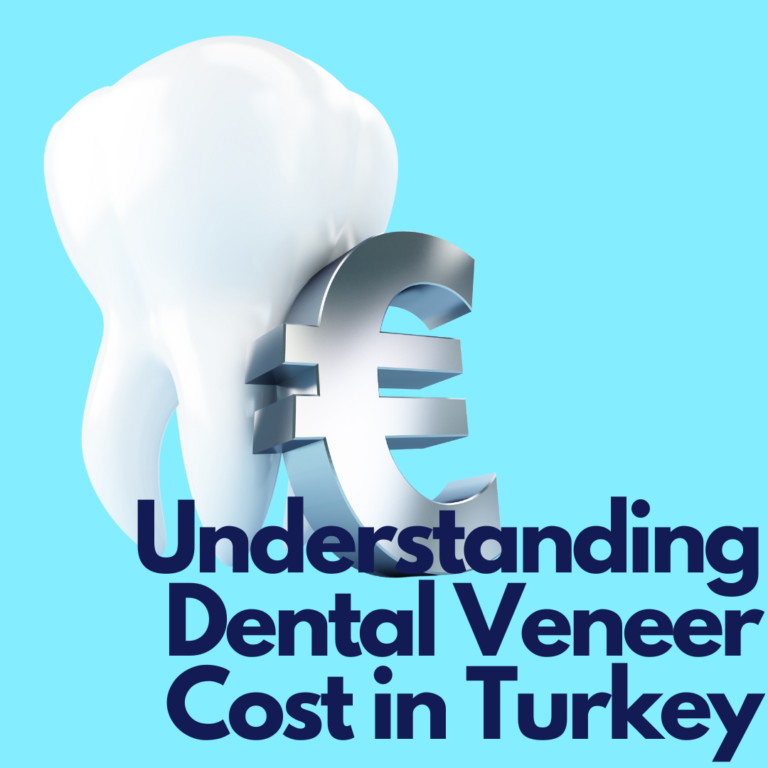Dental crowns are cosmetic dental procedures placed on a tooth to restore the shape, size, strength, and appearance of your decayed, deformed or dysfunctional teeth. Your dentist may recommend dental crowns to protect your tooth if your teeth are weakened by decay or a large filling, restore a cracked or fractured tooth, cover a tooth with a root canal or improve the appearance of a misshapen or discoloured tooth. In addition, dental crowns can be offered by your dentist as a treatment method to support dental bridges or to cover dental implants when necessary.
Dental crowns can be made of different materials, including porcelain, ceramic, metal, and a combination. Your dentist may choose the material depending on the extent of the damage to your tooth and the patient’s aesthetic preferences.

A dental crown treatment usually involves two appointments. At the first appointment, your dentist will prepare the tooth by removing any decay and shaping your tooth to fit the crown. An impression of the tooth is then taken and sent to the laboratory to produce the crown. In the meantime, a temporary crown is placed on the tooth to protect it. In the second appointment, the temporary crown is removed, and the permanent crown is attached to the tooth using dental cement.
You can use your dental crowns for many years with proper care and maintenance. They offer a durable and long-lasting solution to restore your dental health and beautify your smile.
The durability and quality of your dental crowns are closely related to the clinic and dentist you choose. If you want them, the Smile and Holiday Clinic is the best place for you. You can reach our free consultation tool on our website and ask everything you wonder about dental crowns.
Dental crowns are recommended by many dentists, but they have their own pros and cons. In this blog post, we will tell you the pros and cons of dental crowns. You should definitely read our blog before getting a dental crown.
PROS OF DENTAL CROWNS
Dental crowns can solve many of your dental problems and have many advantages. You can find out the suitability of them by consulting your dentist.
Dental crowns provide protection and support to the teeth.
Dental crowns are a prosthesis that imitates the shape of a tooth on a decayed or damaged tooth. Dental crowns protect a weak or damaged tooth from further decay or damage. They can also provide support to a tooth that has had root canal treatment.

Dental Crowns are long-lasting dental prostheses.
Dental crowns are durable and long-lasting. If you do proper care and check-ups, your crowns can last many years. With proper care, your crowns will last for five years or more, often more than ten years. However, the quality of your dental crowns impacts how long they will last. Therefore, the dental clinic and dentist you choose greatly affect the quality of your dental crowns.
Dental crowns provide you with an aesthetic smile.
Dental crowns can be customized to match your natural teeth’ colour, size and shape. Thus, you can achieve a natural-looking and aesthetically pleasing smile with dental crowns. Not only for your natural tooth but if you have had implant treatment before and one of your implants has been damaged, dental crowns also correct and improve the appearance of your implants.
Dental crowns are very comfortable.
Dental crowns are designed to fit comfortably in your mouth. Since they are produced following the structure and shape of your teeth, they are almost as comfortable as your real teeth. They improve the biting and chewing ability of teeth that have lost shape due to fractures or fillings. Therefore, when you chew and bite something, you don’t feel any discomfort or pain.
Dental crowns offer versatile treatment for you.
Dental crowns are used for a variety of purposes, for example, restoring a damaged tooth, covering a dental implant, or supporting a dental bridge. Therefore, if your tooth has trouble with more than one problem, your dentist recommends dental crowns for your damaged tooth. For example, after root canal treatment, you can apply them both to protect your tooth and to improve the appearance of your tooth.
Dental crowns are easy to maintain.
You don’t need to take any special care of your dental crowns beyond regular brushing, flossing and dental check-ups for your natural teeth. This makes dental crowns a convenient and hassle-free solution for restoring dental health and beauty.
CONS OF DENTAL CROWNS
While dental crowns are an effective solution for restoring your damaged or decayed teeth, they can have some potential drawbacks.
Getting dental crowns may require multiple dentist visits.
Getting a dental crown usually requires multiple visits to the dentist, one to prepare and measure your tooth and another to place the crown. This can be time-consuming, especially if the crown must be custom-made in a dental lab. Therefore, considering coming to Turkey, especially for dental crowns, you should consider this process.
Dental crowns can cause you to develop tooth sensitivity in some cases.
After a crown has been placed, it is possible to experience some sensitivity to temperature changes or pressure. Although this usually disappears after a few weeks, some patients may experience continued tenderness or discomfort. This sensitivity is because before the dental crown treatment is applied, the teeth are filed for dental crown placement.

There is a risk of damage to dental crowns.
Dental crowns are durable but can still be damaged or shattered when subjected to excessive force, wear, or tear. This can affect your smile if your dental crown is on a front tooth that may be more visible.
Tooth decay can occur under dental crowns.
Especially in root canal treatments, tooth decay may occur again due to insufficient cleaning of decays. While a dental crown can protect a damaged or decayed tooth, it can make future decay more difficult to detect. If the decays are not noticed early, they may require additional treatment, such as root canal treatment.
As a result, dental crowns are good solution for restoring your damaged or decayed teeth, as they can provide strength, protection, and a better appearance. However, there are also potential disadvantages, such as the time involved and the possible risk of sensitivity or damage. You should discuss their options with their dentist to determine if dental crowns are the best choice for their needs and situation. You can consult the expert dentists of Smile and Holiday Clinic to discuss the drawbacks of dental crowns and their suitability for you and get answers to your questions.


